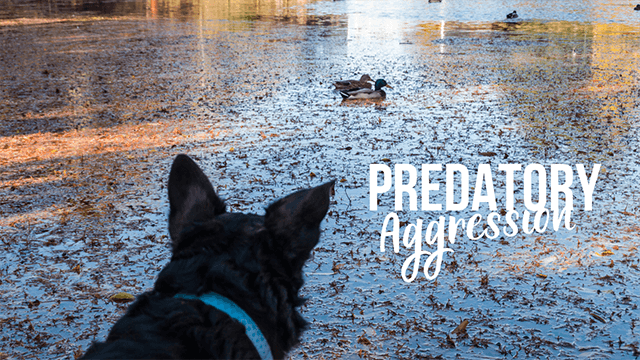Blog
Dog to Dog Aggression - Prey Reactivity In Dogs
Food And Treats
February 05, 2021

Does your dog bark and lunge on the leash when there are other dogs or animals nearby? How do you know if it's because he's hunting them like prey? Take a quick read below to see if any of these traits sound like your dog:
Key Characteristics:
- Triggers on sudden or quick movements. This dog is often triggered by sudden and quick movements, quite typical of smaller animals. When a dog is hunting, there are several phases of the hunt - tracking, chasing, biting, and retrieving. Not all dogs are strong in all 3 phases, but these instincts can cause inappropriate and sometimes dangerous behaviours when used to interact with other dogs.
- Fixation on the Object/Animal. When the dog is triggered, his ears often stay up and alert - often to where the skin on the forehead is furrowed. He locks on with a direct and fixated stare and his body goes almost still at the end of the leash, tense, poised, and spring-loaded for forwarding action to leap towards the prey. When these dogs lean into the leash there’s no mistaking that if the leash broke, they would be chasing down the prey to bite.
- Tracking. When on a leashed walk, the dog is often alert and looking for something to hunt in his environment. Attention on the handler is often inconsistent and the dog is aroused, constantly looking back and forth for something to hunt.
- Chasing. Upon seeing "prey", the dog will charge to the end of the leash - the tension is constant or increasing (never slackening) as the dog becomes determined to get to the other animal. At this stage, it can often seem to the handler that there's nothing they can do to break that fixation. While these dogs may bark in frustration if they are held back on the leash or behind a barrier, they typically go silent as the "prey" gets closer and the opportunity to bite becomes higher.
- Biting. If allowed to bite, the prey bite is often full (to the back of the mouth) and will be paired with the shaking or twisting of the head to bring the prey down and kill it.
- Tendency to target smaller animals. This type of dog typically has a tendency to become overly aroused when smaller animals are present. Their desire to approach the other animal almost seems obsessive.
Causes
- Genetic trait. Dogs with predatory drives are born with this innate behaviour. While all dogs have some degree of it (because they are dogs), depending on breeding, some will exhibit stronger traits than others. Some dogs show stronger traits in tracking, chasing, or biting, or all three, depending on the purpose for which they were bred, and the individual dog. It is important to note that because this is genetically part of who this dog is, it is impossible to completely train this trait out of the dog.
How to treat
- Obedience training. Obedience training is a must for these dogs so they learn impulse control. This dog must learn that there are times in his life where he must curb his instincts. When we do this, it allows the dog to become more under control and safer to be around for everyone.
- Appropriate outlets for his instincts. Because predatory behaviour is a natural inborn instinct in the dog, it's important for the responsible owner to provide safe and appropriate outlets for him to exhibit these behaviours, or frustration behaviours can develop. Activities such as herding, competitive obedience, agility, tracking, etc. can be integral in allowing the dog to exhibit these innate traits in a safe and productive way.
- Management. Again, because predatory instincts are genetically a part of this type of dog, it is important to realize that this instinct can never be shut off. As a result, day to day living with a dog like this requires careful management, to ensure that the dog is never given an opportunity to exhibit this behaviour in an unmanaged or unsupervised environment. Dogs like this should not be left unsupervised or without controls when around other animals.
Do you have a dog that shows predatory or prey reactivity with other dogs? Email us at [email protected] for more information on how we can help you!
Categories
All Categories
Dog Aggression
Food And Treats
Stay connected with news and updates!
Join our mailing list to receive the latest training tips and updates from me!
Don't worry, your information will not be shared.
We hate SPAM. We will never sell your information, for any reason.




